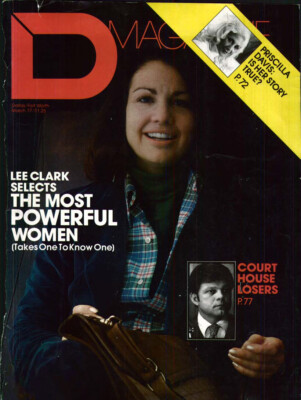Where else but theDallas County Commissioners Courtcould such nonsense happen? Notat the city council:George Schraderwould never letit get that farout of control. Not at the school board: they find excuses to go behind closed doors when voices start rising over a polite decibel count. Not even in the Texas Legislature, where members have been known to stand on tables and sing the “Eyes of Texas” in attempts to restore order.
Here on Saturday sat four of the five members of the Commissioners Court, individually backbiting one another and collectively sweating under heat applied by the Dallas Citizens Council, Moody’s Investor Service, and Federal Judge Sarah T. Hughes. The task: raise taxes by 20 percent while unmercifully slashing budgets, two acts which normally don’t go hand-in-hand.
All the while Commissioner Tyson, who vehemently objected to the wholesale budget butchery, was over at Louisiana Downs playing the horses.
Which is worse? To be found sitting in a budgetary meeting struggling to pay the piper for two years of your own fiscal bumbling; or 1 to be caught by the Times Herald in the parking lot of Louisiana Downs nursing a drink when your wife claims you are off in the woods west of Wichita Falls nursing a cold?
So it goes at the Commissioners Court, adding another verse to the litany of blunders which began emerging in 1974 with the bail bond scandal. That one sent County Judge Lew Sterrett to the showers and brought in colorless Republican commissioner John Whittington to take his place, giving Republicans hope that a new day of reform – Republican reform – was dawning at the county court house. Next, scandal moved down to the jailhouse, and the following election saw Democratic Sheriff Clarence Jones bumped out of office by Republican Carl Thomas, who was the beneficiary of voters again grown weary of reading about courthouse blunders.
The stage was set. Now – finally – the old ways of the Democratic courthouse tribe would be brought into question by these invaders from the other party. Republicans could take a politically classic good government stance. With just one more vote on the Commissioners Court, possibly Jim Tyson’s, they could eliminate the outmoded practices of an outdated courthouse system while incidentally pushing out courthouse Democrats. The archaic and wasteful road and bridge districts controlled by individual commissioners could be consolidated; the woefully obsolete system of property evaluation could be modernized and streamlined, resulting in greater revenues with no tax increases; the notion of metropolitan government could be examined with an eye to eliminating overlapping responsibilities of local government units.
It didn’t work. John Whittington disappointed his own party stalwarts by not being partisan enough, by giving in too easily to Democrats on such politically important items as voting machine operations and Republican accusations of voter fraud. Along the way Whittington’s lack of leadership apparently didn’t sit well with his Republican colleague Jim Jackson, elected to the Commissioners Court from North Dallas in 1974. Whatever set Jackson off, he landed on the other side in an “unholy alliance” with Democrats David Pickett and Roy Orr: against consolidation, against a realistic fiscal policy at the county-owned Parkland Hospital, and for slashing the budget instead of reforming the county’s old-fashioned budgetary process. To be fair, Jackson worked hard to cut the proposed 40 percent tax increase in half, with little time to consider the larger issue. His intentions are admirable; his selection of bedfellows and his methods are being questioned all over town.
Governmental questions are complicated, but political matters seldom are: they boil down to points won or lost on the electoral Scoreboard. Republicans clearly are the losers this round, because they missed a golden opportunity to clearly identify themselves in voters’ minds as the managerially competent, good government party battling against the old, the discredited, ways of county government. That means that Jim Jackson is a bigger loser; as a young county commissioner he could have ridden the reform wave for all it’s worth. John Whittington, ironically enough, came up a winner simply by getting out of the way. When in a public meeting commissioner Jackson told him to “shut up,” he did exactly that. Once out of voters’ minds, he seemed safely out of trouble.
Beyond that, citizens found themselves back on the same old merry-go-round as two years ago, especially after the Times Herald began nosing around. Quite likely the newspaper’s interest is a signal that this won’t be the last round of embarrassment to be suffered by a courthouse crowd that seems impermeable to change.
Embarrassment was only a minor problem for Commissioner David Pickett who in the beginning preached rock-ribbed fiscal conservatism and displayed a Marine-inspired discipline. Pickett was just the kind of man who looked right to challenge almost anybody at the courthouse, from John Whittington to Henry Wade, and he didn’t bother to hide his ambition to do so. Pickett’s troubles began with the revelation that he spent $44,000 of taxpayers’ money to refurbish -his suburban service center office, complete with fine furniture and carpeting. Then the Herald scorched Pickett for using county work crews to demolish privately-owned structures. Next the Herald nailed Pickett for paving a road near Lake Ray Hubbard which led nowhere but to five private residences, including those of several Pickett campaign contributors. Pickett denied impropriety, but the damage was done. Pickett’s political future is in jeopardy, especially considering he is a Democrat in a district which has a fair number of Republicans.
Surely the most embarrassed must be Commissioner Jim Tyson, who was cruising through the Herald’s investigation untouched, so confident of his position that he had his wife lie to reporters about his whereabouts one weekend. What Tyson didn’t know is that for several weeks Herald reporter Paul West had been digging through gasoline bills charged to the county by Tyson. There was a peculiar pattern. Every few weekends Tyson turned in charge tickets from filling stations on paths leading to two places, Hot Springs and Bossier City, coincidentally, on racing weekends.
When Tyson’s wife Thelma told Herald reporters one Friday that he was ill and had left town (to go to the woods near Wichita Falls) and wouldn’t return until Sunday night, all Paul West had to do was check the racing schedule. Sure enough, the races were on in Bossier City. West and a Herald photographer hopped a plane to Shreveport where they caught a can and sped out to Louisiana Downs, armed with the make and license of Tyson’s county car. They found it almost immediately, and, sure enough, moments later here came Tyson, drink in hand, as the photographer snapped shots of the commissioner who was supposed to be recovering from a terrible cold, 350 miles to the west. The next morning he wasn’t present for a crucial meeting on the budget.
In the rough and tumble world of county politics it’s doubtful that Tyson’s embarrassment will translate into a challenge at the polls. Even Roy Orr, who took his own lumps from the Herald for improper use of his county car, came out of the melee with only a scratch or two. He may have even come out ahead. For one thing, he demonstrated without a doubt that he controls county government for now, as long as he can control the improbable voting bloc he patched together with Commis- | sioners Pickett and Jackson.
But that’s only the politics of the matter. We should note that this latest brawl involved more than partisan infidelity and ideological bickering. It involved, at its core, a non-partisan, governmental conflict: the conflict between an obsolete form of government and the modern, urban area it is supposed to govern. The old-style tribe that populates the county courthouse is not unlike any other tribe in the way it demands conformity to its rites and customs. That even a bright-eyed newcomer like Jim Jackson cannot escape its archaic political style is only a testament to its strength.
Whether it is strong enough to withstand another browbeating from thevoters in the next election is anotherquestion. Right now I’m pretty surewhere I’d place my bet.
WINNERS
& LOSERS
WINNER JUDGE JOHN WHITTINGTON
County Judge John Whittington stayed out of the line of fire, which, strangely enough, made him look like a hero. While Pickett, Orr and Jackson hacked away at the budget, Whittington sat quietly, every now and then suggesting that the road and bridge districts be consolidated. He actually looked like a potential reformer. Whittington also managed to stay clear of the whole melee with the Times Herald. On the other side though, some local Republicans wonder what kind of a county judge would let a majority of the commissioners court, including fellow Republican Jim Jackson, secretly organize against him and openly denigrate his leadership capabilities.
WINNER THE DALLAS TIMES HERALD
Credit begins with editor Ken Johnson, who came to Dallas from the WASHINGTON POST. Last fall when Johnson heard about the traditional system of dividing up county road money equally among the four commissioners, he scratched his head. How could one quadrant of the county have precisely the same road needs as the other three quadrants? Johnson first sent one reporter to sniff around over at the courthouse, but as the story developed, committed three reporters full time. Reporters Rone Tempest, Howard Swindle and Paul West turned in a series of stories clearly showing how irresponsibly Dallas County commissioners can act. Just as it did two years ago in the bail bond scandal, the Herald left the Dallas News at the starting gate.
WINNER COMMISSIONER ROY ORR
Orr wins again. Doesn’t he always win at the courthouse? Once again Orr proved he can muster a majority at the courthouse, Republicans or not, and this time his three-man majority was forged with the help of Republican Jim Jackson. While Commissioners Jackson and Pickett fell from grace with their controversial words and deeds, veteran Orr had nowhere to fall, surprising no one by playing his hardball brand of politics, learned at the knee of former County Judge Lew Sterrett.
WINNER SHERIFF CARL THOMAS
Thomas may not feel like a winner, or even look like one, but it’s how you play the game that counts. Thomas plays rough. As soon as Thomas heard the commissioners were going to knock 14 percent off his $11 million budget request, Thomas began recalling deputies “on loan” to other county departments. Although Thomas’ tactics failed this time, his performance as a courthouse greenhorn showed plenty of moxie, and portends good things for the sheriff’s department.
LOSER COMMISSIONER DAVID PICKETT
Once the bright young star at the courthouse, David Pickett clearly has political problems. He took a serious beating from the Times Herald investigation, which strongly suggested that he had abused his road and bridge funds, spending them for political purposes. His unabashed budget slashing didn’t help either. Now Pickett, thought to be invincible in 1978, may be vulnerable to Republican opposition in his Northeast Dallas County commissioner’s district. Almost amusing is the fact that the dean of the courthouse, District Attorney Henry Wade, holds Pickett’s political future in his hands. It is Wade who will decide whether the grand jury should look into any impropriety in Pickett’s spending. That’s the same Henry Wade who has been sitting around listening to Pickett’s low talk about challenging Wade in 1978.
LOSER AUDITOR GEORGE SMITH
Bureaucrats normally have a way of disappearing into the woodwork at the first sign of trouble, but county auditor George Smith will have a tough time doing so in this case. As auditor, Smith oversees all county expenditures – a check on those people spending the money. Not only was Smith lax in watching Commissioners Orr and Tyson’s use of gas credit cards, he too took what appeared to be a purely personal trip to San Diego, while charging the gas to the county. No doubt the next time Dallas County district judges consider re-appointing Smith to another two-year term, they’ll wonder whether Smith was the fox guarding the county henhouse. To Smith’s credit, he reportedly was very cooperative with Times Herald reporters who were searching his records, including his own gas bills.
LOSER COMMISSIONER JIM JACKSON
Jackson came out of the courthouse muddle untainted personally, but there may be a lot of Northwest Dallas County Republicans who will remember how he formed an alliance with Democrats Pickett and Orr and how he slashed fellow Republican Sheriff Carl Thomas’ budget. To those Republicans who have dreamed of Republican dominance at the courthouse, Jackson’s political performance may be long remembered. Whether they will do anything about it is another question. Jackson is one of the few GOP elected officials on the scene today with real potential for higher office.
UNDECIDED COMMISSIONER JIM TYSON
Though Tyson’s day at the races made some of the most entertaining headlines In the whole fracas, he can’t really be called either a winner or a loser – yet. Horsing around is nothing new on the Commissioners Court. At least Tyson had the good sense to get rid of his county car and repay to the county his travel expenses back and forth to the track. He may still come out of it standing up.
ALWAYS ON TOP
DISTRICT ATTORNEY HENRY WADE
Henry’s always on top, but he can’t be put in either the winner or loser camp this time. He never searches out wrongdoing among his fellow elected officials, but when the newspapers start hammering he’s there for a fair share of the headlines. If he’s won anything in this melee, it’s the quiet confidence that he won’t be challenged at the polls by fresh-faced newcomer David Pickett.
Get our weekly recap
Brings new meaning to the phrase Sunday Funday. No spam, ever.
Related Articles

Restaurants & Bars
The Best Japanese Restaurants in Dallas
The quality and availability of Japanese cuisine in Dallas-Fort Worth has come a long way since the 1990s.
By Nataly Keomoungkhoun and Brian Reinhart

Home & Garden
One Editor’s Musings on Love and Letting Go (Of Stuff, That Is)
Memories are fickle. Stuff is forever. Space is limited.
By Jessica Otte

Football
The Cowboys’ Draft Class Is Heavy on Athleticism and Heavier on Beef
Dallas entered the weekend needing help on both lines. It exited with plenty of fresh faces to plug those gaps.
By Dan Morse


